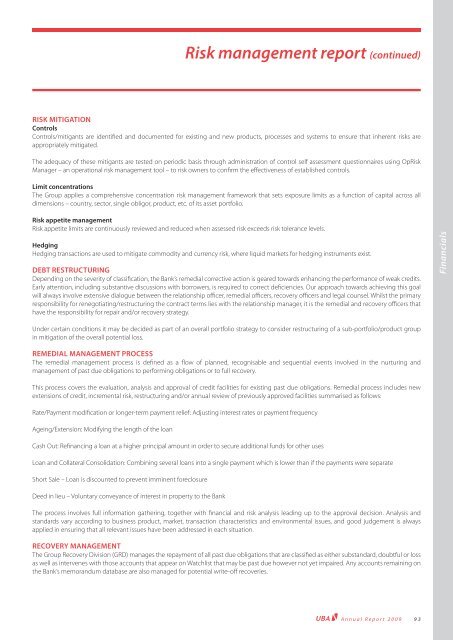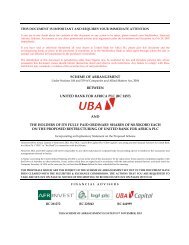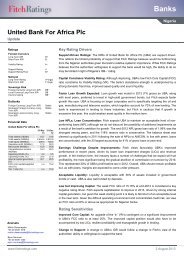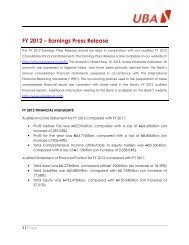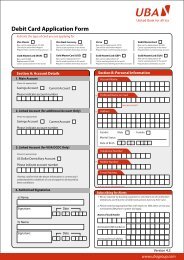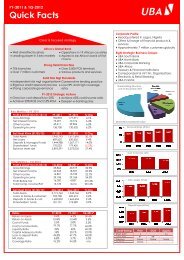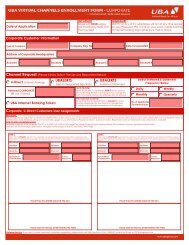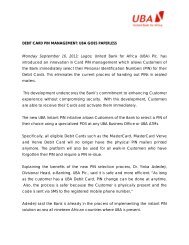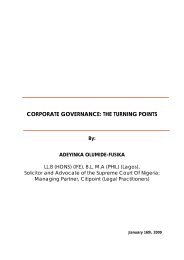2009 Annual Report and Financial Statements - UBA Plc
2009 Annual Report and Financial Statements - UBA Plc
2009 Annual Report and Financial Statements - UBA Plc
You also want an ePaper? Increase the reach of your titles
YUMPU automatically turns print PDFs into web optimized ePapers that Google loves.
Risk management report (continued)<br />
RISK MITIGATION<br />
Controls<br />
Controls/mitigants are identifi ed <strong>and</strong> documented for existing <strong>and</strong> new products, processes <strong>and</strong> systems to ensure that inherent risks are<br />
appropriately mitigated.<br />
The adequacy of these mitigants are tested on periodic basis through administration of control self assessment questionnaires using OpRisk<br />
Manager – an operational risk management tool – to risk owners to confi rm the eff ectiveness of established controls.<br />
Limit concentrations<br />
The Group applies a comprehensive concentration risk management framework that sets exposure limits as a function of capital across all<br />
dimensions – country, sector, single obligor, product, etc. of its asset portfolio.<br />
Risk appetite management<br />
Risk appetite limits are continuously reviewed <strong>and</strong> reduced when assessed risk exceeds risk tolerance levels.<br />
Hedging<br />
Hedging transactions are used to mitigate commodity <strong>and</strong> currency risk, where liquid markets for hedging instruments exist.<br />
DEBT RESTRUCTURING<br />
Depending on the severity of classifi cation, the Bank’s remedial corrective action is geared towards enhancing the performance of weak credits.<br />
Early attention, including substantive discussions with borrowers, is required to correct defi ciencies. Our approach towards achieving this goal<br />
will always involve extensive dialogue between the relationship offi cer, remedial offi cers, recovery offi cers <strong>and</strong> legal counsel. Whilst the primary<br />
responsibility for renegotiating/restructuring the contract terms lies with the relationship manager, it is the remedial <strong>and</strong> recovery offi cers that<br />
have the responsibility for repair <strong>and</strong>/or recovery strategy.<br />
Under certain conditions it may be decided as part of an overall portfolio strategy to consider restructuring of a sub-portfolio/product group<br />
in mitigation of the overall potential loss.<br />
REMEDIAL MANAGEMENT PROCESS<br />
The remedial management process is defi ned as a fl ow of planned, recognisable <strong>and</strong> sequential events involved in the nurturing <strong>and</strong><br />
management of past due obligations to performing obligations or to full recovery.<br />
This process covers the evaluation, analysis <strong>and</strong> approval of credit facilities for existing past due obligations. Remedial process includes new<br />
extensions of credit, incremental risk, restructuring <strong>and</strong>/or annual review of previously approved facilities summarised as follows:<br />
Rate/Payment modifi cation or longer-term payment relief: Adjusting interest rates or payment frequency<br />
Ageing/Extension: Modifying the length of the loan<br />
Cash Out: Refi nancing a loan at a higher principal amount in order to secure additional funds for other uses<br />
Loan <strong>and</strong> Collateral Consolidation: Combining several loans into a single payment which is lower than if the payments were separate<br />
Short Sale – Loan is discounted to prevent imminent foreclosure<br />
Deed in lieu – Voluntary conveyance of interest in property to the Bank<br />
The process involves full information gathering, together with fi nancial <strong>and</strong> risk analysis leading up to the approval decision. Analysis <strong>and</strong><br />
st<strong>and</strong>ards vary according to business product, market, transaction characteristics <strong>and</strong> environmental issues, <strong>and</strong> good judgement is always<br />
applied in ensuring that all relevant issues have been addressed in each situation.<br />
RECOVERY MANAGEMENT<br />
The Group Recovery Division (GRD) manages the repayment of all past due obligations that are classifi ed as either subst<strong>and</strong>ard, doubtful or loss<br />
as well as intervenes with those accounts that appear on Watchlist that may be past due however not yet impaired. Any accounts remaining on<br />
the Bank’s memor<strong>and</strong>um database are also managed for potential write-off recoveries.<br />
<strong>Annual</strong> <strong>Report</strong> <strong>2009</strong> 93<br />
<strong>Financial</strong>s


